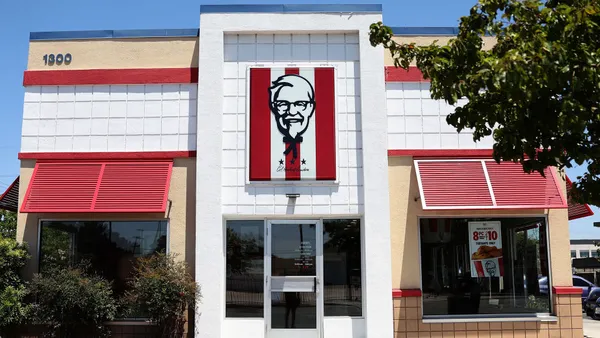Dive Brief:
- Seventeen McDonald's employees in Chicago have filed a lawsuit against the company claiming it failed to address violence at its restaurants, according to CNBC.
- The workers already filed a complaint with the Occupational Safety and Health Administration in May alleging a pattern of violence at McDonald's restaurants. The suit claims that McDonald's, as the restaurants' landlord, didn't design restaurants to minimize the threat of violence and seeks an injunction to stop the renovations.
- The suit also claims that the company has not provided adequate training on how to handle conflicts.
Dive Insight:
McDonald's employees believe the company's Experience of the Future design compromises safety because it includes split counters at a lower height, which makes it easier for customers to confront employees directly. Because of this component, the suit seeks a halt to McDonald's renovation program.
This is the latest challenge to that program, which was started in 2017 and has cost an estimated $6 billion. Earlier this year, franchisees expressed grievances over the cost of the renovations, prompting the company to extend the deadline on the remodels.
The latest claims are much more serious, however, than a strained bottom line. According to a report by the National Employment Law Project, at least 721 incidents of violence were reported or covered by media at McDonald's restaurants over a three-year period. The study acknowledges that threats and some incidents go unreported, so this number is likely low. Over the last three years, employees at a McDonald's in Chicago called 911 1,356 times, but the media only covered two occurrences.
McDonald’s is hardly alone in navigating the problem. According to the Bureau of Labor Statistics, there were 23 homicides at quick-service restaurants in 2016, and 15 in 2017. At full-service restaurants, there were 21 homicides in 2017. In other words, the entire industry is prone to violent incidents. But McDonald's, with its 14,000 domestic locations, has a large footprint and a vast employee base, which makes it an easy target.
Notably, this lawsuit has a number of layers to it. It not only throws a potential wrench in the company's extensive and expensive remodeling effort, but it also brings up the joint-employer issue, examining whether McDonald's is responsible for what happens at its franchised locations. This lawsuit, however, dances around that by acknowledging McDonald’s position as its franchisees’ landlord.
Further, it brightens the spotlight on McDonald's training policies, which are already under scrutiny for another class action suit filed last week claiming the company's negligence in rectifying sexual harassment patterns.
Like its class action suit, this lawsuit claims "systemic" issues within the McDonald's system. Indeed, these issues aren't new. A 2011 article in Slate looked into why there is such a prevalence of violence at fast food restaurants.
Clearly changes won’t come easily, especially for a ship the size of McDonald's and especially for chains like McDonald's that operate late at night. But whatever comes of this lawsuit might set a precedent and set into motion new, necessary safety standards to keep restaurant workers safer.













